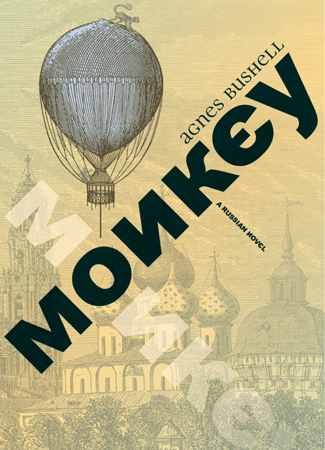Monkey: A Russian Novel
By Agnes Bushell; Littoral Books, 2022
Review by Dana Wilde
Agnes Bushell’s latest novel Monkey is in some ways a very conventional and in other ways a very peculiar book.
We’ll get to the peculiarity in a moment (note the subtitle, “A Russian Novel”), but meanwhile Monkey’s plot, characters, and scenic narrative will be comfortably familiar to readers of mainstream modern fiction. So will a good part of its thematic material, which includes (among other things) the threat of political authoritarianism; a stolidly contemporary view of the lot of women in society; and the strange nature of language, writing, and the writing life.
As the story opens sometime in the mid-19th century, the aging poet Anastasia Barakova has secluded herself upstairs in the family home and claims to have stopped writing, much to the chagrin of her publishers and the Russian reading public. Her blackout is due to her grief and anxiety over the disappearance of her son, Nikolai, also a writer and probably a revolutionary who may or may not have run afoul of the Tsar and his insidiously pervasive secret police.
Anastasia appoints her friend Marko Volchek, a well-connected female writer who poses, George Sand-style, as a male writer, to find the lost Nikolai, if he’s even still alive. It turns out he is a more-or-less legendary figure in Russian literary and underground political circles, and a lot of people are looking for him.
Among them are a dastardly captain in the secret police, an Argentine playboy/scientist, and Fyodor Fyodorov and Elena Blavatskaya, characters based loosely on the historical cosmist philosopher and theosophist spiritual medium of roughly the same names.

Various people, for various reasons, are also looking for Nikolai’s missing book, titled, as rumor has it, Monkey. There are sketchy stories about the possible whereabouts of its manuscript, about whether it was ever published, about whether it was ever written. Along the way there are midnight kidnappings, imprisonments, brawls, brothels, dreams, and hallucinations. When Madame Blavatskaya gets involved, there are seances that shake the confidence of the most adamant materialists, providing openings in the narrative for discussions of cosmist metaphysics and the spirit. There are so many characters, you need a list to keep track of them (and the book provides it).
This massive cast of characters should sound familiar to readers of 19th century Russian novels. The book’s subtitle invites us to think of it as an imitation of the sprawling stories written by authors such as Dostoevsky, Tolstoy, and Turgenev. Trying to write a novel in 21st century American English that actually reads like a 19th century Russian novel seems like a recipe for literary disaster.
And therein lies the chief peculiarity of the book: It succeeds. Agnes Bushell, of Portland, may be the most skillful prose stylist now writing in Maine, on or off the best-seller radars. Monkey carries an authentic feel and atmosphere of (a translation of) a Russian novel.
This means it gives shape to a certain sense of fatalism about human relations, and a certain sense of irony about the impossibility of happiness—or for some characters even meaning—in this life. At the same time, the wholly human narrative voice, much of it in the persona of Marko, retains the conversational, wry, good-natured tone usually found in Bushell’s books, relieving Monkey of the heaviness of much Russian fiction. This unlikely atmospheric mixture is maintained successfully, sentence for sentence, for 600 pages.
This is no small feat.
The more familiar you are with 19th century Russian history, literature, and philosophy, the more you’ll get out of Monkey. But as in all really good books, this ancillary knowledge is enriching, not prerequisite to enjoying the story.
People used to read massive novels for the same reasons people watch season after season of streaming TV series today. Monkey really fills that bill.
Dana Wilde lives in Troy. He is a member of the National Book Critics Circle.





